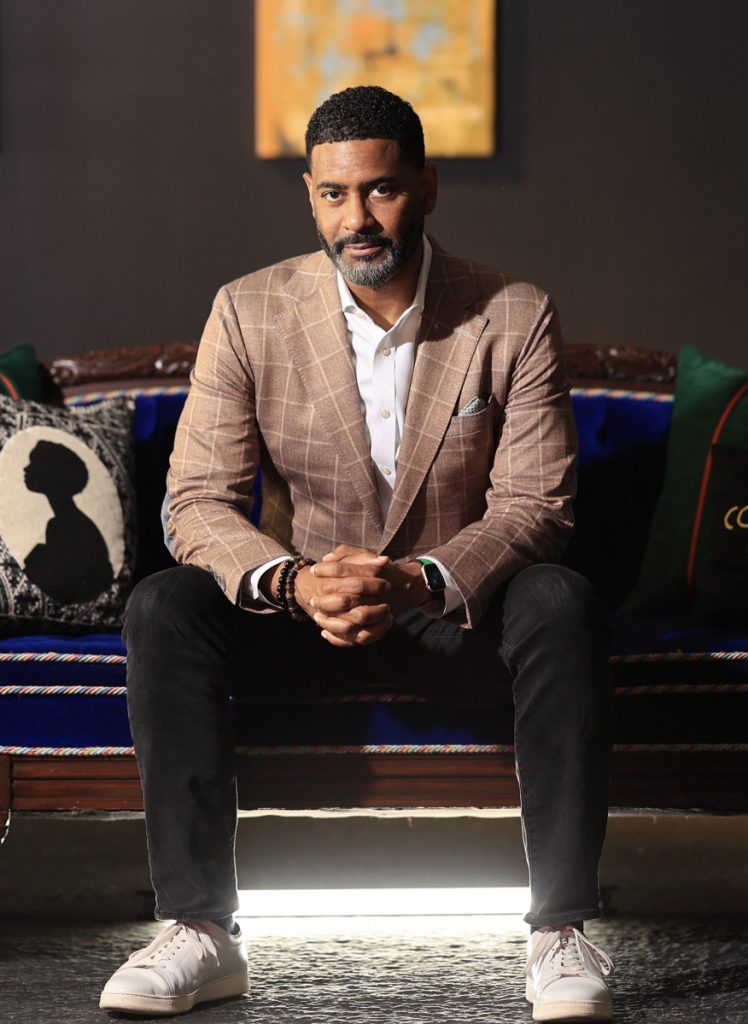
James Buckser
Staff writer
The Rev. Otis Moss III feels we have a duty to work against harmful systems for the good of future generations.
“Systems of destruction, suffering and evil are like a virus,” Moss said. “It’s our responsibility to continue to inoculate our nation against the virus that mutates, and that is a virus that seeks to shrink, destroy and marginalize human potential and possibility. I believe that the faith tradition, at its best, has the ability to inoculate.”
Moss will speak at 2 p.m. today in the Hall of Philosophy to open the Interfaith Lecture Series’ Week Eight theme, “Freedom of Religious Expression.”
Moss, a graduate of Morehouse College and the Yale Divinity school, serves as senior pastor of Trinity United Church of Christ in Chicago. His early experiences at Trinity while Barack Obama, a member of the church, was running for president helped to inform his latest book, Dancing in the Darkness: Spiritual Lessons for Thriving in Turbulent Times.
“I kept copious notes in my journal of some of the experiences, and those experiences ended up in the book,” Moss said. “What are the virtues that are necessary to thrive in difficult moments? What do you hold on to when it seems that you cannot see the possibility of morning coming? What do you do when you feel completely alone, and what action should you take when you see that the world seems to be in complete chaos? What is our responsibility as human beings, and what is our responsibility as people of faith?”
Moss said he began writing his book before COVID-19, about “six, seven years ago,” stopping and starting several times in the process.
“It’s a reflection on where we are as a nation, and what are the spiritual virtues that we need in order to thrive,” Moss said.
“Love plus justice is a central theme of the book” with Dancing in the Darkness, Moss said, using Martin Luther King Jr.’s analogy of “what do you need for a complete life?”
“A life that is rooted in developing oneself, one’s community, one’s family,” Moss said. “You’ve got to have these three dimensions at an area of spiritual growth and development.”
Moss’ preaching often features progressive themes, calling attention to issues like economic inequality and mass incarceration, which is different from the faith tradition popularized by the media, which he calls white evangelicalism.
“White evangelicalism has close ties to capitalism; in many ways it’s capitalism in the ecclesiastical garments,” Moss said. “The Black faith tradition has always been centered on the alleviation of suffering, the liberation not only of Black people, but of all people.”
The “true heart of the Christian tradition, of the Judaic tradition,” Moss said, has always been seeing how people can live out their full potential.
“Rome ends up crucifying Jesus because he was against the Roman Empire. The prophets of the Old Testament were pushed and marginalized and persecuted because they were raising questions about collective systems, and how do we as a community operate to ensure that everybody flourishes,” Moss said. “The heart of every faith system is always about how we flourish together, and not just simply how we flourish by ourselves.”
Moss said his lecture will address “how we as a nation experience the turbulent moments that we’re in and how we thrive in these moments,” and how we can create a cultural “mixtape.”
“Bringing together people of different faiths, different cultures, different ethnic backgrounds, different racial backgrounds, to create a movement … will collectively transform not only our nation, but our world,” Moss said.
Moss hopes Chautauquans at his lecture will think about the similarities across different groups.
“I hope they will learn that there’s a lot of commonality between different communities,” Moss said, “but also, the uniqueness of the African American spiritual tradition and what it offers for us to build a community collectively in this nation.”
Moss has spoken at many venues, but he sees Chautauqua as a particularly good forum for discussion.
“In other spaces, some of these ideas may be brand new to the community that I’m speaking to,” Moss said. “The beautiful thing about being at Chautauqua is you’re speaking to people who are well-read and well-informed about the issues, and they raise such wonderful questions, and they want to be part of the solution, and not just be sideline pessimists.”
Moss said every person can be a part of the solution, “part of transformation,” by working with their connections and communities “pushing for an agenda that seeks to alleviate suffering.”
“Wherever you are across the globe, the alleviation of suffering is a universal value we should all hold dear.” Moss said.
While he has been at Chautauqua many times, Moss is looking forward to returning.
“It’s been a few years, and the Chautauqua community has always been kind to myself and to my family,” Moss said. “I’m very excited about the conversation we will have on Monday.”




